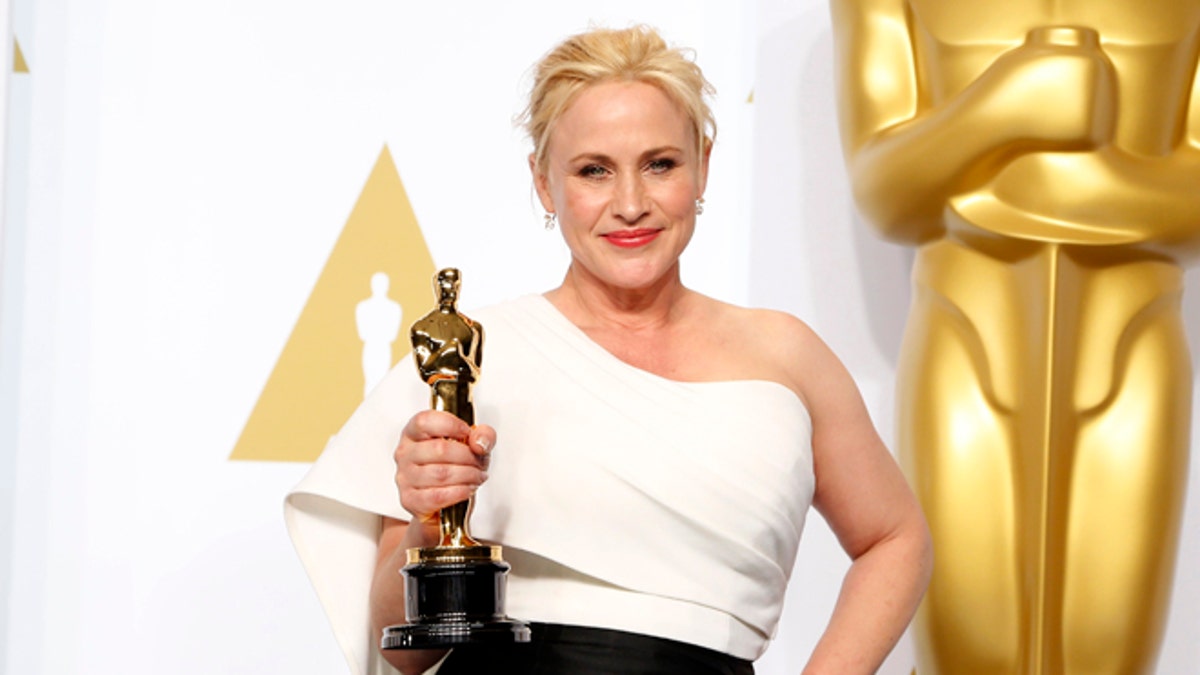
Feb 22, 2015. Patricia Arquette, best supporting actress winner for her role in "Boyhood" poses with her award during the 87th Academy Awards. (Reuters)
Patricia Arquette is a dedicated activist, with years of struggle behind her, but her most effective effort may have been her shortest.
In accepting the Best Supporting Actress Oscar in 2015, she spoke out from the podium demanding equal pay and equal rights for women. Political speeches at the Oscars are nothing new, but Arquette’s 20-second cri de coeur may have done more to change the world than all the paeans and pleas at all the Academy Awards before her.
Click here to subscribe to FOX411’s YouTube channel
The impact of Arquette’s speech, along with the challenges still ahead before her cause of true sexual equality is achieved, were the focus of an intimate “Dinner for Equality,” co-hosted by Arquette and Salesforce CEO Marc Benioff at a private home in the Hancock Park section of Los Angeles Thursday night.
As guests gathered for cocktails, Arquette told Variety she believes she has paid a price for throwing down the gauntlet at the Oscars, having already lost two acting jobs because of that stand. “I’m okay with that,” she said. “But it’s not just about acting, and it’s not about me as an actor. I don’t believe this is fair for anybody. I want to live in the America I believe in, that really is fair, that really has possibilities, and really does treat people of all races and all sexes equally.”
One reason that Arquette may be content with that sacrifice is that her Oscars speech seems to have had a measurable impact. According to several of the guests at the dinner, Arquette’s words helped prompt the passage of the California Fair Pay Act that went into effect January 2016, which has been called the most far-reaching equal pay law in the United States, and sparked a movement in corporate boardrooms to review and remedy pay inequities.
The progress of the last year inspired Arquette and Benioff to bring together the worlds in which they move: entertainment, politics, business and activism for Thursday’s dinner. Jennifer Lawrence graced the center table along with Elon Musk and Reese Witherspoon. More Hollywood luminaries in attendance included Lily Tomlin, Marisa Tomei, Maria Bello, Minka Kelly and James Van Der Beek. Musical notables included India Arie and Stevie Wonder, both of whom performed at the end of the evening.
From the business world came CEOs Jeff Dailey of Farmers Insurance Group, Bernard Tyson of Kaiser Permanente, Shahrzad Rafati of BroadbandTV and Brian Krzanich of Intel. From politics, state senator Hannah-Beth Jackson. Activists included Noreen Farrell, executive director of Equal Rights Advocates; filmmaker Kamala Lopez; Katherine Spillar, executive director, Feminist Majority Foundation; and Jessica Neuwirth, president of ERA Coalition.
Some of those notables spoke at the event, which its organizers hope will become a perennial. Lawrence, who advanced the cause in an online essay, spoke without prepared remarks. “It’s weird being a public figure talking about all of this stuff because you put a target on your nose,” she said. “When I wrote that essay I got a lot of support but I also have a Republican family in Kentucky who told me my career was effectively over.”
Lawrence said it’s vital to shed the notion that we live in a post-feminist era. “I don’t know who came up with that term, but it’s the most damaging term that we have, because it’s just not true.”
Sen. Jackson told the gathering that on seeing Arquette’s speech at the Oscars, she immediately called her staff and told them they must introduce an equal pay bill in the legislature the very next day. Jackson later circled back to Arquette, who spoke out in support of the bill.
The Fair Pay Act garnered wide support, including lawmakers of both parties, passed overwhelmingly and was signed into law in October, almost exactly seven months after Arquette spoke out.
Jackson told Variety that business orgs like the California Chamber of Commerce supported the bill in part because they see women’s pay inequity as an economic issue. “Because of that inequality we leave about $39 billion on the table,” said Jackson. “If that money were available and women had that money in their pockets, they would spend it, and it would advance the economy. It would end up being put into services or goods, things that the business community is very interested to see happen.”
While that legislative effort was under way, Salesforce executives went to Benioff, their CEO, and asked for an audit of their own company’s pay practices. Benioff was sure there would be no problem, but approved such an audit. “It was about a six-month effort, a very manual effort,” said Cindy Robbins, Salesforce’s executive VP for employee success, who runs the company’s HR department. “We have around 20,000 employees. We found there were some discrepancies, both male and female. It took around $3 million to fix that gap.”
Farrell of Equal Rights Advocates praised Benioff for making that commitment. “He said, ‘what if I made women’s equality a transformational priority for Salesforce? What would happen?’ I think what’s happened is he’s leading business, as Patricia is leading Hollywood. Advocates and workers need those influencers to make a difference.”
Benioff, in addressing the dinner, acknowledged that it is a challenge for CEOs to commit to fixing pay inequities, as repairing a major discrepancy could actually prevent a company from making its numbers and cost corporate leaders their jobs. But he urged other business leaders to start the process.
The Sony hack, which revealed pay inequities among stars and salaried employees alike, put Hollywood’s own gender imbalance in the spotlight. But Arquette said the issue is much broader than the entertainment industry.
“It’s all through every industry,” she said. “I hate when people make this conversation that we’re having only about this industry, our industry. Because it’s not.”
Farrell noted that under California’s equal pay law, the kind of inequities exposed by the Sony hack could put companies at risk now and in the future. She cited three practices that can be adopted by all industries, including Hollywood, to head off such problems: payroll audits like that conducted by Salesforce; not relying on past salary history to determine new salaries (because past salaries can reflect past discrimination); and transparency in the criteria that guide pay decisions.
“I never met an employer who thought they were discriminating on the basis of sex until they did an audit,” said Farrell. “I think its very important for every company, including those in Hollywood, to audit its pay and look at what’s happening.”
Wonder, also speaking off-the-cuff, called for the tech industry to make its wares more accessible to people with visual handicaps. “The reality is we have a lot of people talking loud and saying nothing. They’ve been given too much airtime… And obviously I feel that if we don’t get this going immediately, before a person I have a lot of respect for is no longer President, it may take years and years for it to happen.”
“But we can’t even base it on politics or who is President, Republican or Democrat,” he added. “Our passion for the rights of women, justice in any way, has to be stronger than all those mouths that are saying absolutely nothing, just talking a bunch of bull.”
Arquette herself is far from finished, and hardly sees her cause as won. She is championing an Equal Rights Amendment to the U.S. Constitution, and still working for economic empowerment of women.
“We have tens of millions of single moms in the country,” said Arquette, “and they’re really struggling, especially when they’re paid less than men. We have 33 million women and kids who wouldn’t be in poverty, who have full-time working moms; if they were just paid their full dollar, they wouldn’t be in poverty. They wouldn’t be wealthy, but they wouldn’t be in poverty.”













































